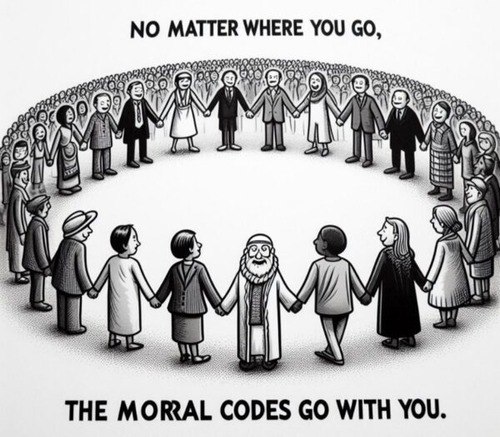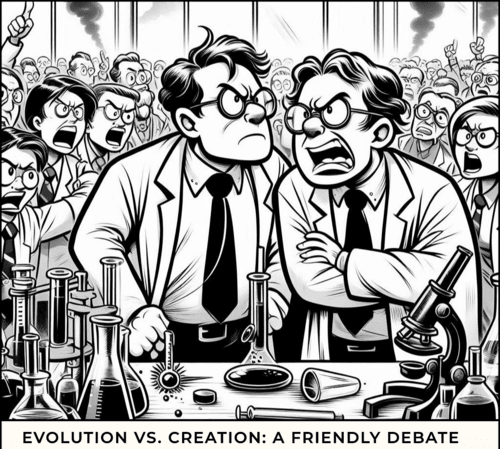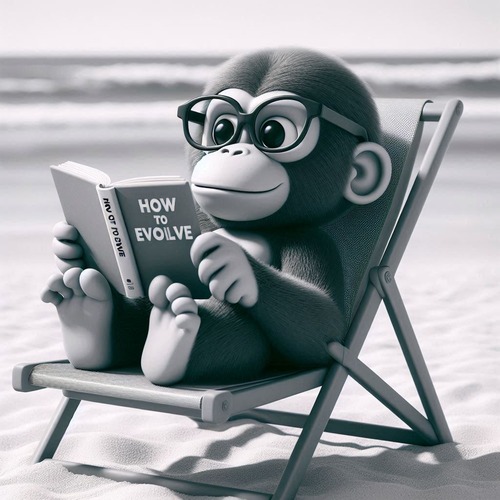The Universal Moral Laws: Signposts to the Divine
Moral Laws: A Universal Truth Across Borders
In every corner of the world, regardless of culture or creed, certain acts are universally condemned. Rape and murder, for instance, are atrocities that transcend geographical and societal boundaries, and are recognized as inherently wrong by the collective human conscience. These universal moral laws which are explained far better by the likelihood of God’s existence than the idea that they arose as the product of matter, time and chance, begs the question: could such a consensus be a mere coincidence, or does it point to an underlying moral law that governs our sense of right and wrong?
The human experience of morality is not just a social construct but a profound and universal phenomenon that persists across cultures and epochs. Throughout history, core moral values such as honesty, compassion, and fairness have been upheld as guiding principles of human conduct. This remarkable consistency across diverse societies suggests the presence of moral universals, originating from a source beyond human invention—a moral lawgiver.
The Universal Moral Laws
Despite staggering diversity in belief systems, practices and cultural expressions, a profound unity underlies the moral codes of human societies. Thou shalt not kill. Thou shalt not steal. Thou shalt not bear false witness. These primordial moral injunctions have been sacred across the world, pointing towards a universal moral grammar that all people intuitively understand.
The Objective Nature of Moral Oughts
When we assert a blatant injustice or a reprehensible act is morally wrong, we are not merely expressing a personal preference—we are invoking a binding ethical reality that exists independently of what any individual or culture avows. The Moral Argument posits that such objective moral oughts can only be adequately grounded in a transcendent, objective source of ethical truth.
The Divine Command Theory
One of the most robust explanations for this ethical objectivity is the Divine Command Theory, which roots morality in the commands of a supremely good, authoritative lawgiver. On this view, objective moral duties flow from the immutable nature and will of God. Murder is evil not by cultural consensus, but because it violates the objective moral order established by a cosmic ethical lawgiver.
The Inadequacy of Naturalism
Conversely, in a purely naturalistic framework devoid of any transcendent reality, morality loses its objective foundations. Ethics could be dismissed as subjective preferences shaped by evolutionary expedients like kin selection and reciprocal altruism. The awesome weight of moral oughts dissolves into the fleeting echoes of chemical and eonic contingencies. Moral realism requires metaphysical realism.
The Argument from Moral Experience
Our lived moral experience resonates with objective ethical realities. We feel moral obligation as a profound imperative, not a personal choice. Our moral intuitions point to binding ethical truths that cannot be revised by any individual or majority. The universal human phenomena of guilt, moral conviction and injustice-sensitivity all presuppose objective moral laws. The Moral Argument suggests a transcendent source best accounts for these deep moral instincts.
The Divine Foundations of Ethics
The universal moral laws mount a formidable cumulative case: The worldwide consensus on moral universals despite radical cultural divergences, the objective nature of ethical oughts, the ontological inadequacy of naturalism to ground moral realism, and the phenomenology of human moral experience all point towards a divine foundation for the moral order.
This powerful argument forces us to grapple with ethics’ cosmic significance. If objective moral truths require a transcendent source, the implications are staggering. Our moral faculties take on the grandeur of a divine endowment, an awesome cosmic privilege conferring human beings with profound ethical duties. The Moral Argument suggests the human conscience reverberates with the harmony of universal moral laws emanating from the mind of God. It elevates ethics from a relativistic preference to a sacred vocation rooted in objective realities and divine obligations. Even for the sceptical, it demands wrestling with morality’s deepest metaphysical significance.
Related Reads:
- The Ontological Argument: Can We ‘Logic’ Our Way to God?
- Aquinas’ Quinque Viae: Timeless Arguments for the Existence of God
- The Kalam Cosmological Argument: A Quest for Cosmic Beginnings
- The Teleological Argument: Unveiling Design in a Universe of Wonder
- The Fine-Tuning Argument: Can Orchestras Compose and Conduct Themselves?
Editor's Pick

From Empty to Overflow: The Abundant Life Jesus Promised
(AND WHY YOU SHOULDN’T SETTLE FOR LESS) We're surviving, but are we thriving? If we're honest, there's a gap between [...]

What Does Jesus Save Us From?
THREE BIBLE TRUTHS ABOUT SALVATION "Jesus saves." We’ve seen it on bumper stickers, heard it shouted at sporting events, maybe [...]

If God Wants Everyone Saved, Why Aren’t They?
THE REFORMED VIEW ON GOD’S DESIRE VS HIS DECREE The question haunts every believer who has lost an unbelieving loved [...]

The One Man Mystery in Acts 17:26: Is It Adam Or Noah?
When the Apostle Paul stood before the philosophers at Mars Hill, he delivered an insightful statement about human unity: “And [...]

Megiddo Or Jerusalem: Where Did King Josiah Die?
Recent archaeological discoveries at Tel Megiddo continue to reveal evidence of Egyptian military presence during the late 7th century BC, [...]

Losing Your Life Vs Wasting It: How Are the Two Different?
AND WHY DID JESUS PRAISE THE FORMER? Jesus spoke one of the most perplexing statements in Scripture: “For whoever wants [...]

Can Christians Be Demon Possessed? What the Bible Teaches
Perhaps you’ve witnessed disturbing behavior in a professing Christian, or you’ve struggled with persistent sin and wondered if something darker [...]

Sacred Fury: What Christ’s Temple Cleansing Truly Means
Mark 11 records the crack of a handmade whip that echoed through the temple corridors. Tables crashed to the ground, [...]

Did Jesus Cleanse the Temple Twice?
OR DID JOHN DISAGREE WITH THE SYNOPTICS ON TIMING? One of sceptics’ favourite "gotcha" questions targets what they see as [...]

Self-Authentication: Why Scripture Doesn’t Need External Validation
"How can the Bible prove itself? Isn't that circular reasoning?" This objection echoes through university classrooms, coffee shop discussions, and [...]
SUPPORT US:
Feel the Holy Spirit's gentle nudge to partner with us?
Donate Online:
Account Name: TRUTHS TO DIE FOR FOUNDATION
Account Number: 10243565459
Bank IFSC: IDFB0043391
Bank Name: IDFC FIRST BANK






